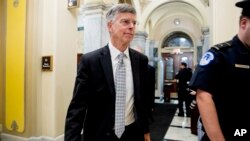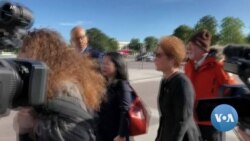The top U.S. diplomat in Ukraine told impeachment investigators it was his "clear understanding" that Kyiv would not get military assistance President Donald Trump was withholding this year unless it launched investigations that would help the president politically.
For weeks, Trump has said there was no quid pro quo arrangement with Ukraine — $391 million in military aid in exchange for the investigation he wanted of former Vice President Joe Biden, one of Trump's top 2020 Democratic challengers.
But Bill Taylor, the top American envoy in Ukraine, testified last month that Gordon Sondland, the U.S. ambassador to the European Union, had repeatedly told him that while Trump did not view the deal as a quid pro quo, "I observed that, in order to move forward on the security assistance, the Ukrainians were told by Ambassador Sondland that they had to pursue the investigations."
A transcript of Taylor’s testimony was released Wednesday. He will testify in public next Wednesday as open impeachment hearings start.
In his closed-door session with investigators, Taylor said it was his “clear understanding” that “security assistance money would not come until" Ukrainian President Volodymyr Zelenskiy "committed to pursue the investigation."
The release of Taylor's testimony came as a high-ranking State Department official, David Hale, testified Wednesday about the ouster of America's former ambassador to Ukraine, Marie Yovanovitch, who was viewed by some Trump aides as an impediment to getting Kyiv to open the investigation of Biden and his son Hunter.
A career diplomat, Yovanovitch was abruptly recalled from Kyiv this year and dismissed from her posting months ahead of the scheduled end of her tour.
Trump, in a late July call with Zelenskiy, described her as "bad news." But State Department officials told her she had not done anything wrong and, before her dismissal,requested that she extend her tour into 2020.
Rudy Giuliani, the former New York mayor and Trump's personal attorney, had pressed for Yovanovitch's ouster and for Ukraine to investigate the Bidens.
WATCH: Pompeo Criticized for Failing to Support Ousted US Ambassador to Ukraine
No defense of Yovanovitch
Hale, the third-ranking State Department official, arrived at the Capitol for closed-door questioning. The Associated Press said he was expected to tell impeachment investigators that political considerations were behind the refusal of Secretary of State Mike Pompeo to issue a robust defense of Yovanovitch.
Other Pompeo aides, including his former senior aide, Michael McKinley, have told impeachment investigators that they urged him to defend Yovanovitch, to no avail.
Hale was expected to tell investigators that Pompeo decided that defending Yovanovitch would hinder the release of the military aid Kyiv wanted. Trump temporarily held up the assistance as he asked Zelenskiy for "a favor" in a late July phone call — the investigations of the Bidens and whether Ukraine had interfered in America's 2016 election, not Russia, as the U.S. intelligence community concluded.
While Hale testified, three other Trump administration officials — Energy Secretary Rick Perry, acting White House budget chief Russell Vought and another State Department aide, Ulrich Brechtbuhl — defied congressional demands that they testify before the impeachment inquiry led by the Intelligence, Foreign Affairs and Oversight committees in the House of Representatives.
Trump has been somewhat successful in getting key officials to defy subpoenas and not testify in the rapidly expanding impeachment inquiry. But several national security and diplomatic officials, including some still on the government payroll, have told impeachment panels that Trump was at the center of efforts pressing for the Ukraine investigations to help him politically.
It is against U.S. campaign finance laws to ask a foreign government for help in an American election.
Trump's demands of Ukraine are at the center of the House impeachment inquiry and whether he violated U.S. national security in trying to help himself. Lawmakers already have heard weeks of closed-door testimony about Trump's relations with the Eastern European country in advance of public hearings that open next week.
In coming weeks, the Democrat-led House could cast a simple-majority vote to impeach Trump, a Republican, leading to a trial in the Republican-majority Senate. His conviction in the Senate by a two-thirds vote would oust him from office, but his removal remains unlikely since the votes of at least 20 Republicans would be needed for a conviction.
Senate Majority Mitch McConnell has predicted that Trump will be impeached by the House and then acquitted in the Senate.
Sondland testimony
In revised testimony released Tuesday, Sondland, the U.S. ambassador to the EU and a major donor to Trump's 2017 inauguration celebration, said that he warned an aide to Zelenskiy at a Sept. 1 meeting in Warsaw that the military aid to Ukraine would not be released unless Kyiv publicly launched the investigations.
Sondland's testimony about his conversation with Zelenskiy aide Andriy Yermak in the Polish capital was sharply at odds with Trump's contention there was no quid pro quo. Nonetheless, after withholding the military assistance for weeks, Trump released it, which Kyiv wanted to help fight pro-Russian separatists in the eastern part of the country.
Trump has denied any wrongdoing and has described his call with Zelenskiy as "perfect." Republican lawmakers defending Trump say the fact that the military aid was released proves there was no reciprocal agreement with Ukraine.









